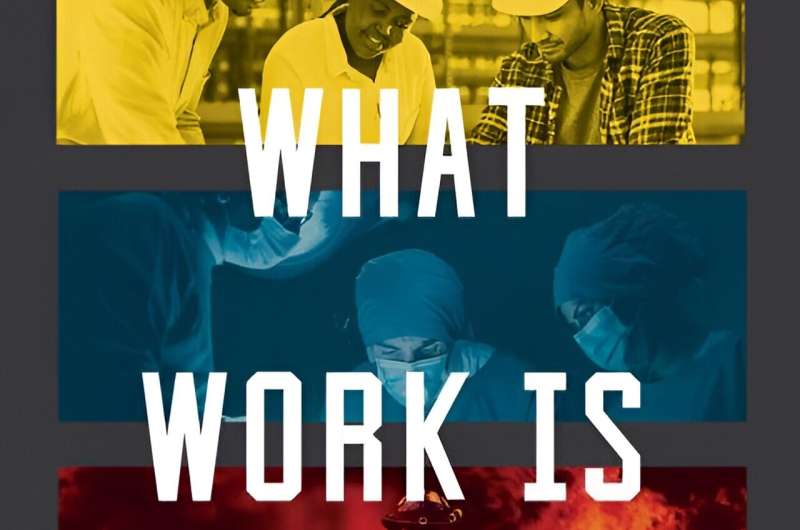This article has been reviewed according to Science X's editorial process and policies. Editors have highlighted the following attributes while ensuring the content's credibility:
fact-checked
trusted source
proofread
New book explores complicated relationship between workers and their work

A new book by a University of Illinois Urbana-Champaign labor historian explores how workers characterize their relationship to their jobs using their own personal mini-narratives, mining that material to ultimately advocate for a more humanistic-centered future of work.
Robert Bruno, a professor of labor and employment relations at Illinois, is the author of "What Work Is," published by the University of Illinois Press.
The book's title is a reference to a Philip Levine poem of the same name, which details the speaker's working-class struggles to earn a living as a day laborer. But the title in Bruno's book functions as a thought exercise for his students to describe their relationship to their work using no more than six words: "Work is _______?"
"For nearly 30 years, my work as a labor studies educator has allowed me to teach and interact with working-class people as students—unionized workers representing all trades, crafts, occupations and sectors, and different nationalities, races, genders and political orientations," Bruno said.
"The one thing they all have in common is nobody ever asks them about their relationship to their work. In writing this book, I really wanted to understand how they experience their work. How are their lives realized through the work they do? How does it affect the multiple aspects of their lives? How do they see themselves through their work? How do they define their work, and how does it define them?"
The thousands of student responses collected range from the profound to the profane, the banal to the intimate. But they serve as a springboard for Bruno to interrogate and explore five larger categories: work and time; the space workers occupy; the impact of work on their lives; the sense of purpose that motivates workers; and the people they work for.
"I sifted and sorted through thousands of these personal narratives, curating and analyzing them, looking for the common themes," Bruno said. "And from those granular, personal accounts, I could then zoom out and talk about larger issues in the contemporary U.S. labor landscape, such as class issues and economic dynamics that are redefining and changing the way we work. If we listen to workers and take their experiences seriously, we begin to see a path to make their work more impactful, more valuable and ultimately more satisfying for them."
The book is not meant to be a final statement on labor or as a capstone for his three-plus decades of studying labor, but "an evocative and powerful encapsulation of how I've come to understand the way that workers experience work," said Bruno, also the director of the Project for Middle Class Renewal, a research-based initiative tasked with investigating labor policies in today's economy.
One of the advantages of having the students write a six-word "essay" is that "it usually cuts right to the core of what work is for most people," Bruno said.
"Work is so fundamental and so basic to people's lives that it undergirds just about everything," he said. "One of the less obvious realizations I had while writing this book was the way that work connects us to others. Work makes other people's lives possible."
The dominant theme throughout the vast majority of the responses was that "people work for others," Bruno said.
"When you ask someone about their work, it's as if you asked them 'On whose behalf do you work for?'" he said. "And they would say, 'I'm working for my family.' 'I'm working for the greater good.' 'I'm working for my country.' 'I'm working to make my union stronger.' 'I'm working for my kids.' It's rare that they say, 'I'm working for my employer.' There is this extensive web of relationships surrounding work, and if you dig below the surface, you can see it's often the connective tissue of people's lives. At the same time, we don't often spotlight the person who does the work itself. We see the product, but not the hands that made that product."
Bruno also is the author of "Justified by Work: Identity and the Meaning of Faith in Chicago's Working-Class Churches"; "Steelworker Alley: How Class Works In Youngstown"; and "Reforming the Chicago Teamsters: The Story of Local 705." He is co-author of "A Fight for the Soul of Public Education: The Chicago Teachers Strike."
Provided by University of Illinois at Urbana-Champaign





















